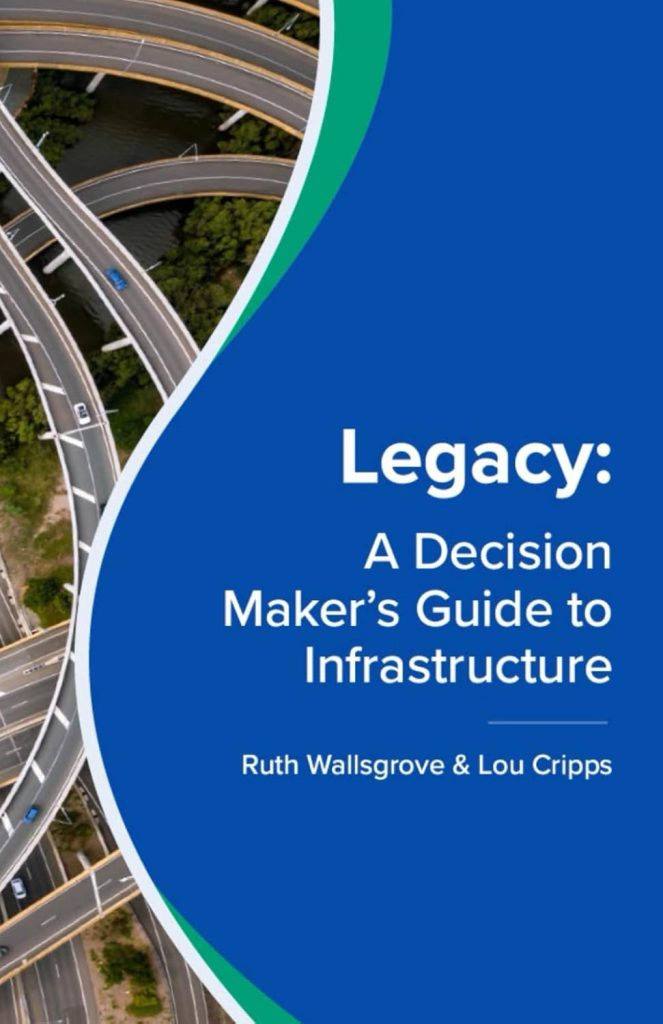
Legacy: A Decision Maker’s Guide to Infrastructure is published!
It’s a slim, elegant book aimed at councillors and C-suites to convey the realities of infrastructure, and the vital support a good Asset Management can provide to them.
Available as ebook or print on demand through Amazon.
‘Legacy: A Decision-Maker’s Guide to Infrastructure is not another technical manual. It’s a clear-eyed, call to rethink how we lead and make decisions about the physical assets that shape our daily lives – from water systems and roads to hospitals, parks, and transit networks.
Written by respected infrastructure thinkers, Ruth Wallsgrove and Lou Cripps, Legacy distills decades of frontline experience into practical guidance for those who carry the weight of stewardship. This isn’t about technology or buzzwords. It’s about responsibility. Clarity. Purpose. And asking better questions.’
Design by the wonderful Matt Miles – much gratitude again
see Resources

Jos van Ouwerkerk, pexels.com
People like us who are responsible for managing public infrastructure assets always leave a legacy. Good or bad, that depends on how well we do our jobs now.
Famously politicians, along with billionaires, are attracted to the idea of a shiny new asset with their name on it. They see themselves remembered and honoured every time anyone drives down a road named for them. But this is often not true.
Firstly, if the road is poorly designed and badly maintained, no-one will be honouring your memory.
Secondly, if this puts the community into long-term debt, or wrecks other community benefits such as a stream or potential for other services – anything that will prevent them from doing what is needed in future: this is a poor legacy. Even if not everyone remembers it was your doing, they will not think kindly about whoever was responsible for such short-sightedness.
Thirdly, by definition, it is a poor public servant who puts their own ego against the needs of their community.
What would be a good legacy?
What would you like to leave for future generations?

Photo by Marcus Spiske, from unsplash.com
‘I wish it need not have happened in my time,’ said Frodo.
‘So do I,’ said Gandalf, ‘and so do all who live to see such times. But that is not for them to decide. All we have to decide is what to do with the time that is given us.’*
What do envy and the attitudes of some people responsible for infrastructure at this time have in common?
Wishing things were different, instead of getting down and actively working to change things.
This was prompted by a conversation last week with an Asset Manager struggling to get their executive to stop moaning about how unlucky it all is, and start planning for what’s going to be needed going forward from Covid-19. People paid a goodly amount of money to take responsibility, who instead are acting like victims: everything would have been ok, if only….
Wanting the world on your own terms is not a strategy. Managing assets is for life, not just for Christmas, not just the good times.
It made me think again how vital the principle of honesty is for good infrastructure management. Chris Lloyd and Charles Johnson in their Seven Revelations of Asset Management (Assets, May 2014) put it like this: Asset Management demands openness about past performance. We have to face up to what’s gone on before, how well (or how badly) the assets are doing.
But we also have to honestly face up to change – even when it looks calamitous. That is what responsibility means.
Even discussing the deadly sins soon comes round to Asset Management!
The serious point is how we build up that sense of responsibility, in ourselves and in top management, to do our level best with what we have taken on. To commit to be better informed, better trained, to learn from best practice and to live it.
No-one forces anyone else to involve themselves in crucial infrastructure. You do not have to apply to be CEO of a public service, or run for election to the Council – but, having made that choice, it’s not a cushy number.
*J.R.R. Tolkien, The Fellowship of the Ring

Recent Comments